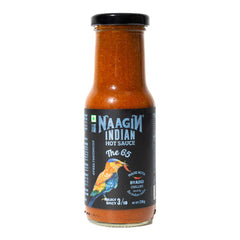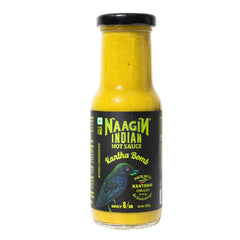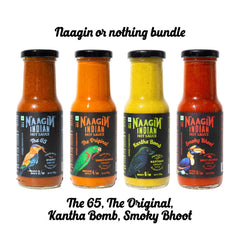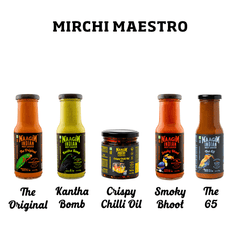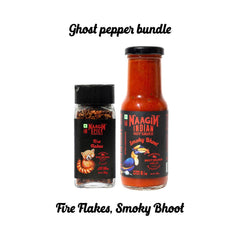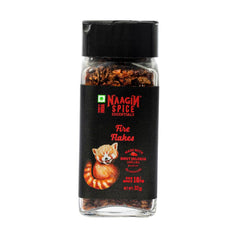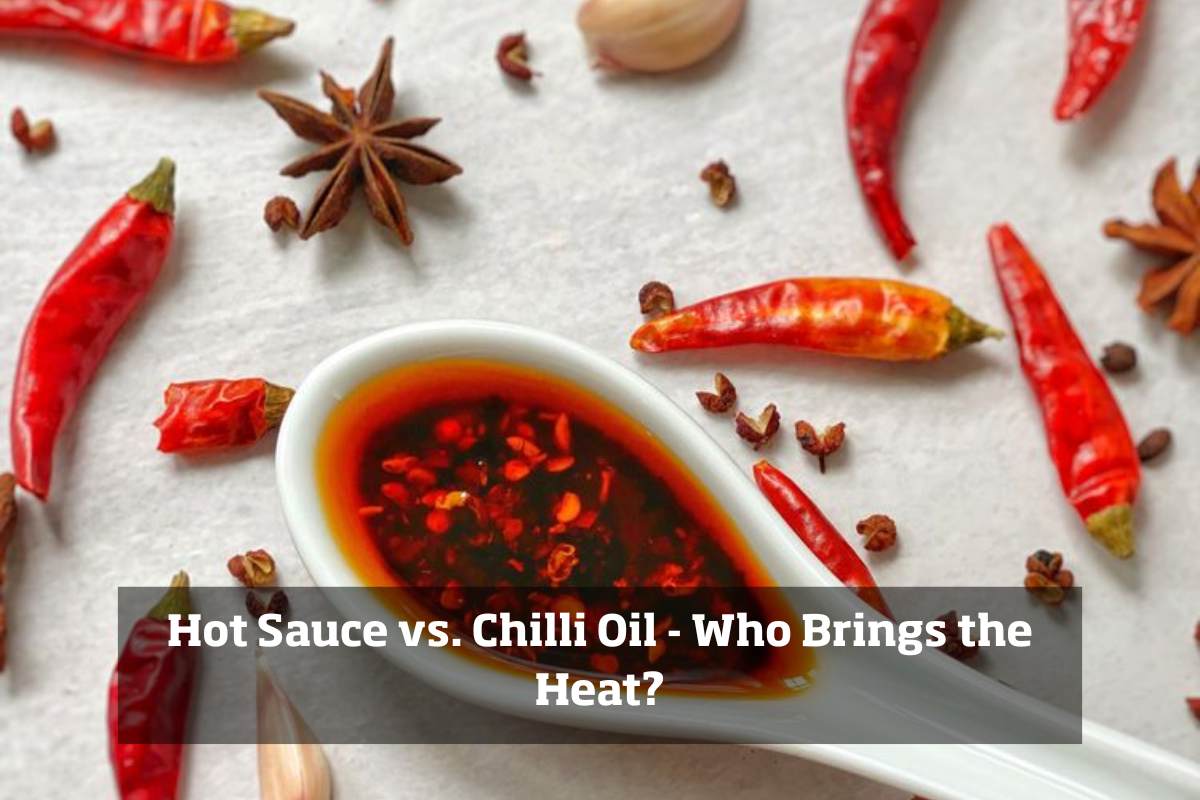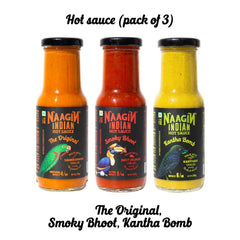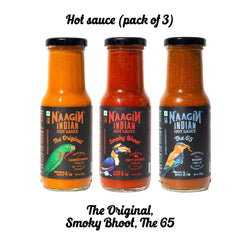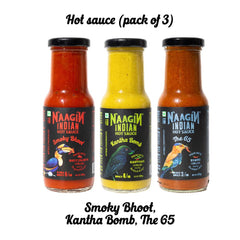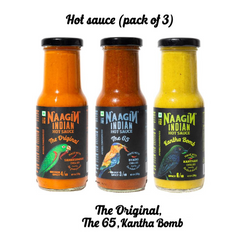
We've all felt it - that fiery tingling on our tongue, sweat forming on the forehead, yet a strong urge to have more.
That's the magic (or madness?) of hot sauce! But why is this spicy friend so addictive?
The Science of Spice
The Capsaicin Culprit
The heat comes from a molecule called capsaicin found in chilies. When we eat hot sauce, capsaicin tricks our taste buds into thinking our mouth is on fire - leading to that burning feeling!
The Pain-Pleasure Cycle
This burning isn't actually harmful. In fact, it's a clever trick that hot sauce plays. When our brain thinks we're feeling heat, it releases happy chemicals called endorphins.
These create a good mood, similar to after exercise. We feel a little discomfort first, followed by pleasure - making us crave that burning sensation again!
More Than Just Heat
Hot sauce isn't only about the fire in your mouth. Capsaicin can make other flavours seem bolder too.
Many hot sauces have spices,herbs, and even fruits, adding layers of delicious tastes that excite our senses.
A Social Adventure
Eating spicy food together can be lots of fun! Sharing the burn, laughs, and maybe happy tears - it creates a sense of connection with friends and family.
It becomes a playful challenge to push your limits together.
Not Everyone's Cup of Tea
Of course, not everyone enjoys dancing with fire on their tongue. How much heat you can handle depends on your genes and the food you grew up with.
Some love intense heat, others avoid it completely.
But even for those who don't like lots of spice, hot sauce can still be appealing. It represents boldness, a spirit of adventure on your plate. It's a way to break free from boring, bland flavours.
So the next time you reach for the hot sauce, remember - it's not just about heat. It's a thrilling adventure for your tastebuds, a celebration of bold flavours, and proof of how amazingly our brains work!
A delicious science experiment is happening right in your mouth.
You May Also Like
Our Blogs
Latest Posts
Tags
- All
- acid in marinades
- affordable cooking
- affordable italian restaurants
- air fryer guide
- air fryer indian recipes
- air fryer meal prep
- air fryer recipes
- ambur biryani
- Appetiser Recipes
- art of plating
- assembling canapés like a pro
- authentic italian restaurants
- beer and chilli combination
- beer for spicy food
- benefits of marinating food
- best air fryer tips
- best biryani in india
- best hot sauce for pasta
- best hot sauce ingredients
- best hot sauces for appetisers
- best italian restaurants near me
- best momo dipping sauces
- best oils for marination
- best pasta and pizza
- best sauces for cheese
- best sauces for momos
- best spicy condiments
- best spicy drinks
- best street food in Mumbai
- best toppings for pizza
- best wine for spicy food
- Bhut Jolokia facts
- biryani around india
- biryani food blog
- bite-sized appetisers with heat
- blue cheese hot sauce pairing
- bold flavour pairings
- brie and green chilli sauce
- budget marinades
- butter chicken date night
- cafes
- Canapé Assembly Guide
- canapé base ideas
- Canapé Ideas
- Canapé Plating Ideas
- canapé presentation tips
- canapé recipe ideas
- Canapés with Heat
- cheese and Naagin sauce pairings
- cheese board ideas
- cheese platter with hot sauce
- chicken
- chili cocktails at home
- chili pepper misconceptions
- chilli and alcohol balance
- chilli and wine pairing
- Chilli Oil
- chilli oil in marinades
- chilli oil recipes
- chilli oil with cheese
- chilli sauce recipe
- chilli sauces for Asian food
- Chinese dumplings (jiaozi
- Chowpatty pav bhaji
- cocktails with hot sauce
- comfort food
- ComfortFood
- cooking for a date tips
- cooking with chilli oil
- cooking with chillies
- cooking with Naagin sauces
- creamy dips for momos
- creative pasta recipes
- crispy air fryer food
- Crispy Chilli Oil
- crispy chilli oil recipes
- custom hot sauce flavours
- Dadar vada pav
- desi momo recipes
- desi twist ravioli
- dindigul biryani
- dinner party ideas
- DIY hot sauce
- DIY pizza night
- DIY sauces
- dumplings around the world
- easy air fryer cooking
- easy gourmet snacks
- easy hot sauce guide
- easy meal prep
- easy momo dips
- easy non-veg dinner ideas
- easy pizza recipes
- easy spicy recipes
- Entertaining Tips
- enzyme tenderisers for meat
- family pizza night
- famous biryani styles
- famous italian restaurants
- farmtotable
- fermented hot sauce
- flavourful marinades
- food and beer pairing
- food and drink matching guide
- food and wine pairing
- food pairing ideas
- foodgasm
- fun dinner ideas
- fusion appetiser recipes
- Fusion Appetisers
- fusion ravioli ideas
- ghost pepper dangers
- ghost pepper flavor profile
- ghost pepper fun facts
- ghost pepper health benefits
- ghost pepper history
- ghost pepper in cuisine
- ghost pepper medicinal uses
- ghost pepper myths
- ghost pepper safety tips
- ghost pepper uses
- ghost pepper vs Carolina Reaper
- ghost pepper world record
- gin spicy recipes
- global ravioli variations
- gourmet cheese and sauce combos
- Gourmet Finger Food
- green chutney for momos
- grilled cheese with hot sauce
- grilled chicken with hot sauce
- grilling recipes
- healthy air fryer snacks
- heat lovers guide
- home-cooked date night recipes
- homemade hot sauce recipe
- homemade marinade guide
- homemade marinades
- homemade pizza ingredients
- homemade pizza toppings
- homemade ravioli
- Hosting Tips
- hosting tips for pizza night
- hot and spicy drinks
- Hot Sauce
- hot sauce and cheese pairings
- hot sauce and chilli oil pairing
- hot sauce and wine
- hot sauce myths
- hot sauce tasting tips
- hot sauce tips
- Hot sauce vs chilli oil
- hottest chili peppers
- how to cool pepper burn
- how to eat dumplings
- how to host a pizza party
- how to make canapés
- how to make hot sauce
- how to make momo chutney
- how to make spicy cocktails
- how to marinate meat
- how to pair hot sauce with cheese
- how to pair wine with spicy chilli
- how to plate canapés like a chef
- how to tenderise chicken
- how to use an air fryer
- how to use chilli oil
- how to use hot sauce
- hummus
- hummus ingredients
- hyderabadi biryani
- impress your date with food
- indian biryani guide
- Indian food culture
- Indian Fusion Recipes
- Indian hot sauce
- Indian hot sauce brands
- Indian hot sauce pairing
- Indian hot sauce recipe
- Indian hot sauce uses
- Indian inspired cocktails
- Indian marinade recipes
- Indian momo sauces
- Indian pantry essentials
- Indian ravioli (ghujia
- Indian street food sauces
- Indian-style canapés
- indianhotsauce
- interactive food night
- international comfort food
- IPA and chilli pairing
- Italian cuisine bangalore
- Italian cuisine mumbai
- italian dining near me
- italian food near me
- Italian ravioli
- Japanese gyoza
- Kantha Bomb
- kolkata biryani
- localfarmers
- lucknowi biryani
- make your own hot sauce
- make your own pizza guide
- malabar biryani
- marinade for grilling
- marinade for vegetables
- marinade science explained. Ask ChatGPT
- marination techniques
- mezcal spicy cocktail
- Modern Indian Snacks
- Mohammed Ali Road kebabs
- momo accompaniments
- momo chutney recipe
- momo dipping sauce variations
- Momo Sauce
- momo sauce ideas
- momos with hot sauce
- Mumbai food guide
- Mumbai street food
- Naagin
- Naagin Bhoot
- Naagin Crispy Chilli Oil
- Naagin fusion food
- Naagin Hot Sauce
- Naagin hot sauce combinations
- Naagin hot sauce momos
- Naagin hot sauce pairings
- Naagin hot sauce recipes
- Naagin sauce combinations
- Naagin sauce pairings
- Naagin Sauce Recipes
- Naagin sauce review
- Naagin sauce with cheese dishes.
- Naagin Smoky Bhoot
- Naagin Smoky Bhoot marinade
- Naagin spicy drinks
- naaginhotsauce
- Noodles Sauce
- pan-seared salmon ideas
- Party Food Tips
- pasta recipe
- Pasta Sauce
- pierogi recipes
- pizza and pasta sauce
- pizza dough tips
- pizza night for guests
- pizza night ideas
- pizza night menu planning. Ask ChatGPT
- pizza night setup
- pizza night with friends
- pizza oven at home
- pizza party at home
- pizza pasta sauce
- Pizza Sauce
- pizza station ideas
- plating
- popular italian food spots
- quick air fryer meals
- ravioli around the world
- ravioli recipes
- ravioli with Indian flavors
- realingredients
- Recipe
- regional biryani varieties
- restaurants
- Roll
- romantic cooking inspiration
- romantic dinner at home
- Salsa
- samosa)
- sandwich sauces
- science behind marinating
- Scoville scale peppers
- sesame peanut sauce momos
- simple gourmet meals
- sindhi biryani
- Smoky Bhoot
- spicy air fryer snacks
- spicy appetisers
- spicy appetisers with Naagin
- spicy cheese recipes
- spicy chilli food pairings
- spicy cocktails recipes
- spicy cooking tips
- spicy dipping sauces
- spicy flavour boosters
- spicy fondue ideas
- spicy food and alcohol pairing
- spicy food ideas
- spicy food lovers
- spicy food Mumbai
- spicy food with beer or wine
- spicy Indian sauces
- spicy marinade ideas
- spicy momo chutney
- Spicy Party Snacks
- spicy ravioli
- spicy sauce ideas
- street food blog
- street food dips India
- stuffed chicken breast recipe
- stuffed pasta recipes
- StuffedPasta
- superhot chili peppers
- tamarind chutney for momos
- tequila spicy cocktail
- The 65
- The Original
- The Original sauce
- top italian restaurants
- Turkish manti
- types of biryani in india
- unique cocktail ideas
- vegetarian air fryer recipes
- wine for Indian spices
- wine with Indian hot sauce
- wonton dip ideas
- wonton)
- yoghurt marinade benefits
BESTSELLERS
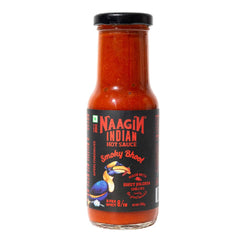
Smoky Bhoot
Rs. 235.00
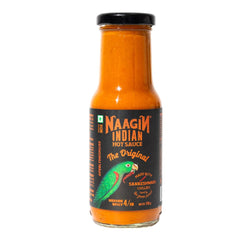
The Original
Rs. 235.00
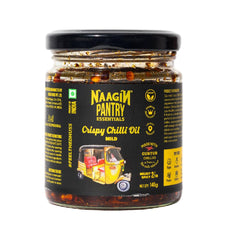
Crispy Chilli Oil
Rs. 280.00
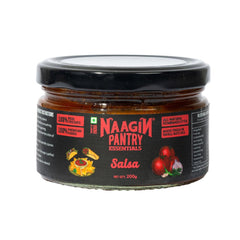
Salsa
Rs. 190.00

Hot Sauce (Pack of 3)
Rs. 680.00
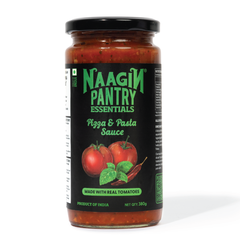
Pizza & Pasta Sauce
Rs. 235.00


